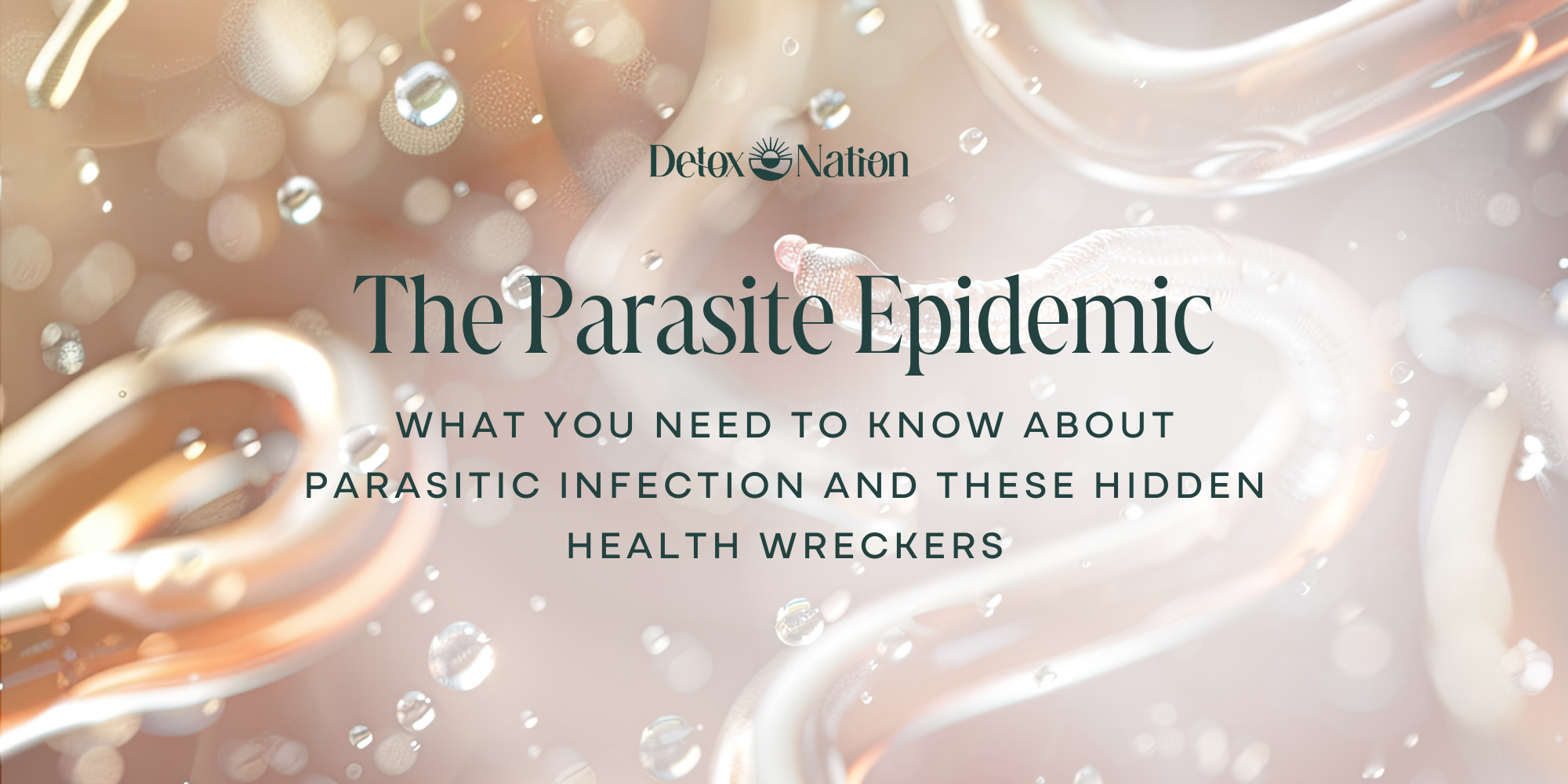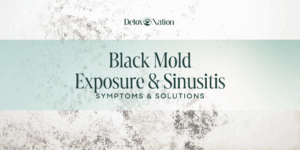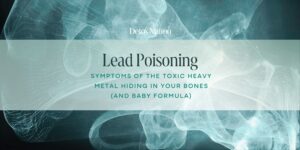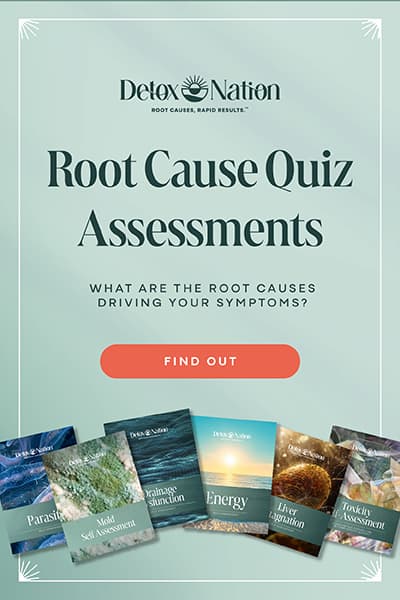From digestive distress to mysterious fatigue and neurocognitive issues, parasites are behind a wide range of unexplained symptoms and infections. Learn how these sneaky organisms invade your body and evade detection.
Parasites are tiny (but mighty) organisms that use other living things, like humans, for food and shelter.
Parasitic infections aren’t just a problem in undeveloped or tropical countries – they happen here in the United States.
These pesky freeloaders might not show up on a colonoscopy or stool test and are notoriously difficult to diagnose.
The symptoms of a parasitic infection range from itching and rashes to stomach pain and diarrhea, intestinal obstruction, anemia, neurocognitive problems, and more.
If you’re ready to learn about:
- Types of parasites
- How you’re exposed to parasites
- Factors that make you (unfortunately) a good host for parasites
- Strategies parasites use to survive and spread in your body
- Symptoms and health issues caused by parasites
- and some action steps,
Then make sure you’ve already eaten, put your feet up, and keep reading!
Key Takeaways
- Parasites rely on hosts for survival and can cause various symptoms and diseases.
- Parasites are real and cause illness all over the world
- You can heal from parasitic infections!

What Are Parasites?
Parasites are organisms that rely on a host organism for survival, often causing harm to the host.
These can include protozoa, helminths, and ectoparasites. Let’s look at some common types and how they can affect your health.
Are Worms and Parasites the Same?
While all worms that affect humans are parasites, not all parasites are worms.
Many people think only of worms when they hear the term “parasite,” but there are many parasitic organisms beyond worms.
Diverse Types of Parasitic Organisms
Parasites come in various shapes and sizes. Some of the most common types include protozoa, helminths, and ectoparasites (1).
- Protozoa are single-celled organisms that can cause diseases like malaria. They often spread through contaminated water or food.
- Helminths, or worms, include roundworms, tapeworms, and trematodes like pinworms. They can live in the intestines or other parts of the body.
- Ectoparasites live on the skin and include lice, ticks, and fleas.
Life Cycles of Parasites
The life cycle of a parasite can be complex and involves multiple stages, often including different hosts.
- Protozoa generally have simple life cycles but can require an insect vector like a mosquito for transmission.
- Helminths usually have multi-stage life cycles. For example, a tapeworm may start as an egg in contaminated food, become a larva in the intestine, and develop into an adult worm.
- Ectoparasites like lice have simpler life cycles, generally involving stages like eggs, nymphs, and adults.
Understanding these life cycles helps in developing better treatments and preventive measures.
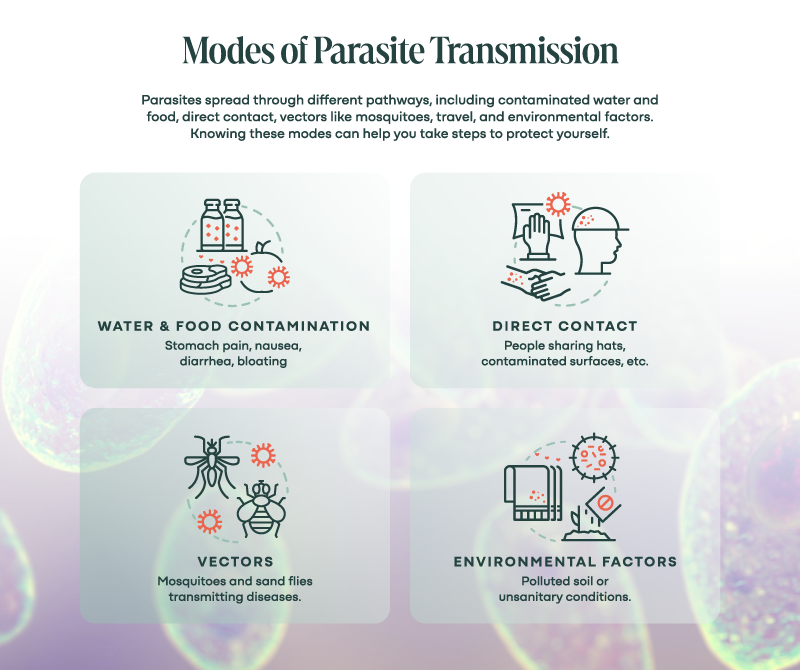
Modes of Parasite Transmission
Parasites spread through different pathways, including contaminated water and food, direct contact, vectors like mosquitoes, travel, and environmental factors. Knowing these modes can help you take steps to protect yourself.
Water and Food Contamination
Parasites often spread through contaminated water and food. Some examples:
- Drinking water from a poorly managed municipal system (including your tap water), pools, or natural bodies of water.
- Swimming in contaminated water can lead to infection. (That’s right, even a dip in a swimming pool can be a source of exposure (2)!)
- Raw produce, factory-farmed meat, and fish.
- Crops irrigated with wastewater or flood water (3).
- Eating undercooked pork can lead to a tapeworm infection. (Yes, Mom was right!)
Ingesting food or water contaminated with fecal matter is another risk.
This fecal-oral route can occur when vegetables are washed with contaminated water (or not washed at all!).
It also happens when individuals don’t wash their hands after going to the bathroom.
If you eat out a lot, consider the kitchen staff preparing your food. Did they wash their hands?
With the right knowledge and strategies, you can remove them from your life and experience deep healing, but no one else can do it for you.
Take our Parasite Quiz to see if parasites may be an underlying cause of your chronic symptoms.
Take the Parasite Quiz Now!Direct Contact and Vectors
Parasites can be transmitted through direct person-to-person contact or by being bitten by an insect vector such as a mosquito.
A vector is something that carries and transmits the parasite. For example, mosquitoes can spread malaria and other diseases when they bite you.
Touching an infected surface and then touching your mouth, nose, or an open wound can also introduce parasites into your body.
But it doesn’t just have to be contact with an open area of your body.
Think of all the times you’ve shared a hat or scarf with someone or put your head on a pillowcase or headrest (4). (Hotel, car, movie theater, airplane, the possibilities are endless.)
Lice infection happens easily through this type of indirect contact.
Just thinking about it makes my head itch!
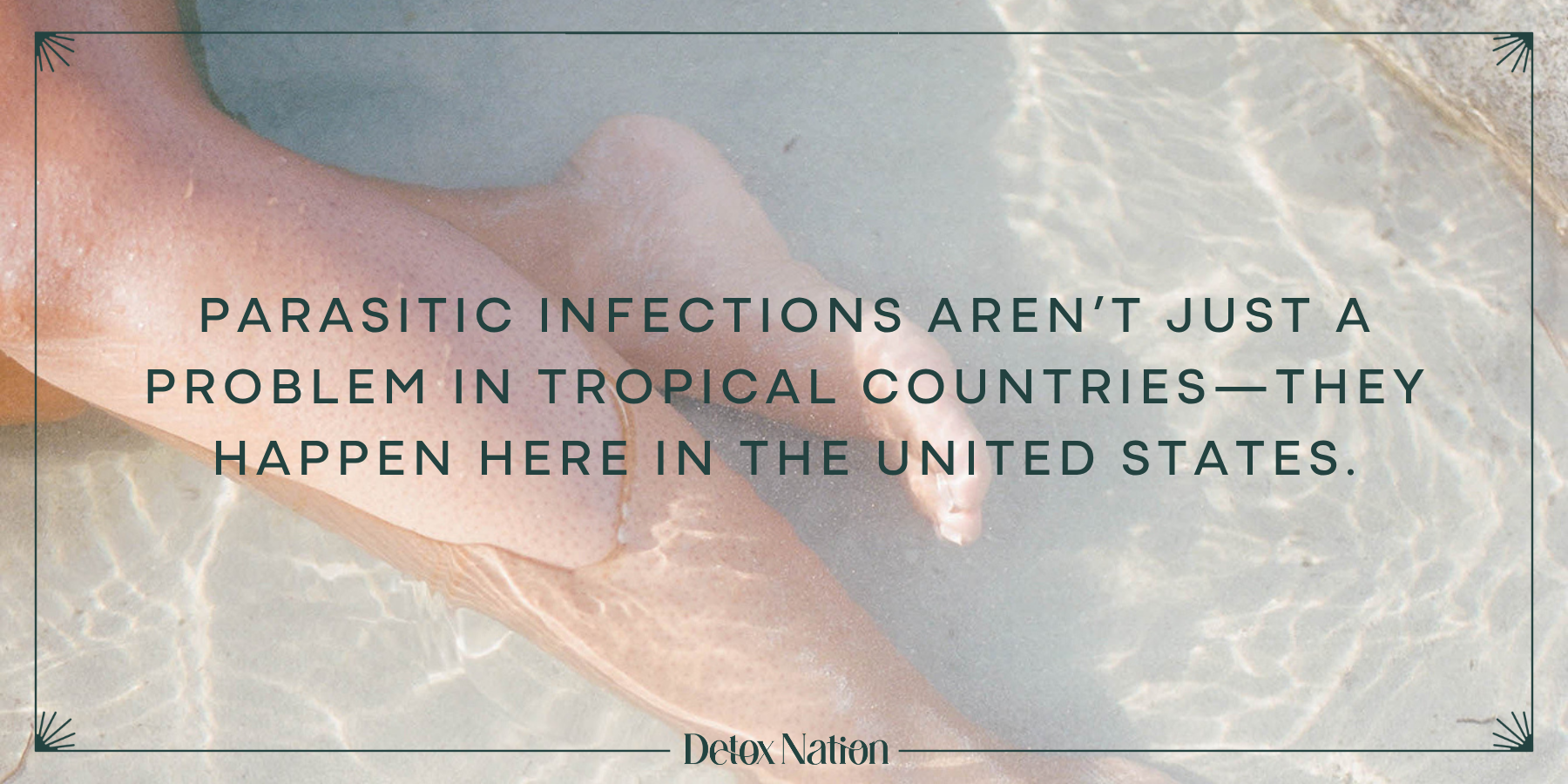
Travel
Traveling to regions where parasitic infections are common increases your risk of exposure.
I call this “parasites in paradise.”
For example, visiting tropical areas can expose you to mosquitoes that carry diseases.
Eating street food or drinking untreated water while traveling can also put you at risk. (“Montezuma’s Revenge,” anyone?)
Environmental Factors
Environmental conditions play a role in the spread of parasites.
Contaminated soil, polluted water sources (5), and poor sanitation can make areas breeding grounds for parasites (6). Soil contaminated with feces is particularly risky.
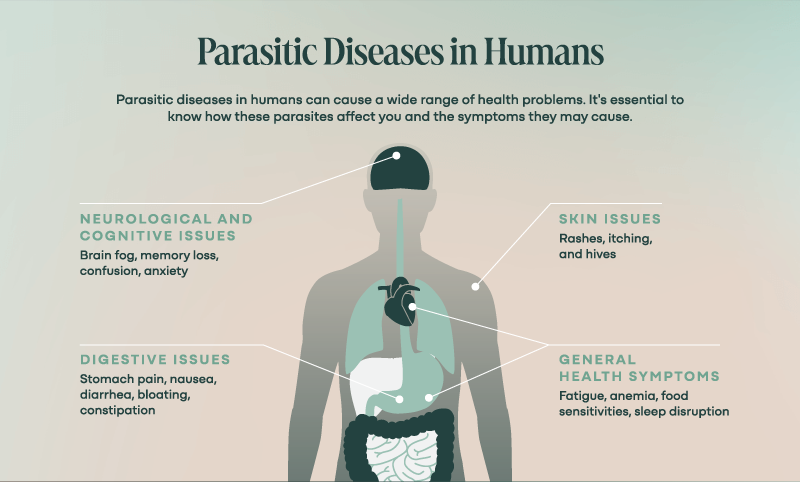
Parasitic Diseases in Humans
Parasitic diseases in humans can cause a wide range of health problems. It’s essential to know how these parasites affect you and the symptoms they may cause.
Your Internal Terrain (Why Am I a ‘Good Host?’)
Your body can become a good environment for parasites due to various factors.
Intestinal permeability, also known as leaky gut, can make it easier for parasites to enter your bloodstream.
When your gut lining is weak, parasites and toxins can pass through it more easily.
An impaired immune response can also make you more susceptible.
If your immune system is not strong, you’re less able to fight off infections.
Exposures to substances like heavy metals, mold, and herbicides and pesticides can weaken your defenses, and compromise your gut, making it easier for parasites to have a party in your body.
These exposures and infections also impact your liver, causing it to be congested and sluggish.
This impairs your detoxification and drainage systems, making you more toxic. (Think of how a moving stream runs clear, but a stagnant stream is unhealthy.)
Common Parasitic Infections
There are many parasitic infections that can affect humans. Some of the most common ones include:
- Malaria – Often spread by mosquitoes.
- Lyme Disease – Can be transmitted through
- Toxoplasmosis – Often from contact with cat feces.
- Babesiosis – A protozoan infection
- Giardiasis – Caused by drinking contaminated water. Can infect your fur-babies too.
- Cryptosporidiosis – Another waterborne infection.
- Hookworms and Tapeworms – Usually from eating undercooked meat.
- Amebiasis – Often transmitted through feces.
- Leishmaniasis – Spread by sandflies.
- Chagas Disease – Transmitted by insect bites.
Parasitic infections can be very different, depending on the parasite involved and how it entered your body.
But what if you have a parasitic infection that doesn’t cause a specific disease like the ones above?
What if it just generally makes you feel awful?

Signs and Symptoms of Infection
The symptoms of parasite infections can be acute or chronic.
Additionally, they can vary widely depending on the specific parasite and the location of the parasite in your body, but often include:
- Gastrointestinal issues like stomach pain, nausea, and vomiting.
- Diarrhea that may include blood, mucus, or disgusting ropey strings of unidentifiable material.
- Fever and fatigue
- Joint pain
- Skin rashes or itching (especially at night).
- Neurological and cognitive symptoms (7) like headaches, brain fog, difficulty concentrating, or confusion (8).
- Anemia (9)
- Food sensitivities (10) or allergies
- Hepatobiliary Disease (11)
- Anxiety and depression (12)
- Sleep disruption
- Teeth grinding (13)
- Light sensitivity (14) that can make it hard to see when driving at night.
This is why I often tell clients that “parasites masquerade.”
You might think you have digestive conditions, neurological conditions, lung conditions, skin conditions, autoimmune disease, hormone dysregulation, depression or anxiety, or arthritis.
But it’s really parasites.
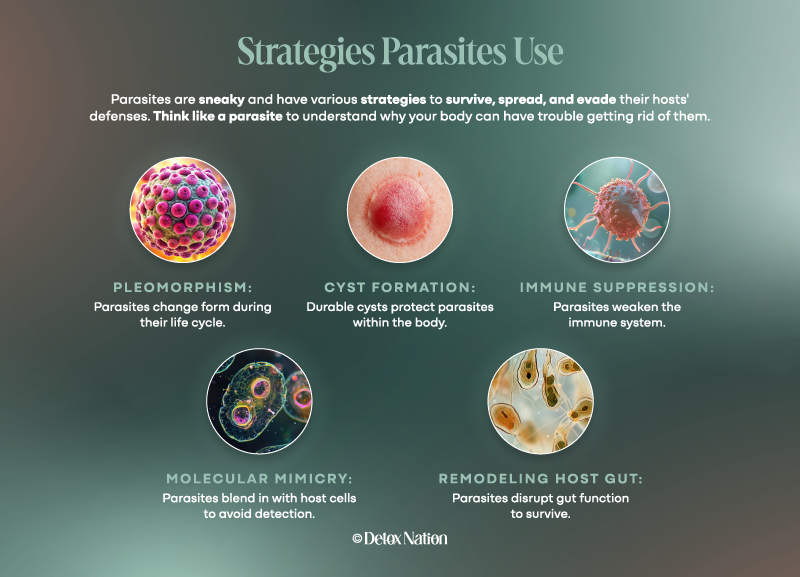
Strategies Parasites Use
Parasites are sneaky and have various strategies to survive, spread, and evade their hosts’ defenses. Think like a parasite to understand why your body can have trouble getting rid of them.
Pleomorphism
Many parasites exhibit pleomorphism (15), which means they can change their form and function during their life cycle.
For example, malaria parasites can exist as sporozoites, merozoites, and gametocytes at different times.
This ability helps parasites adapt to different environments within you, making them harder to identify or treat.
Cyst Formation
Cyst formation is an example of pleomorphism and another tactic parasites use to survive in harsh conditions (16).
Certain parasites, like Toxoplasma gondii, form durable cysts that can persist in host tissues for years.
These cysts protect the parasites from your immune system and harsh environmental conditions, allowing them to reactivate and cause disease when your immune defenses are weakened.
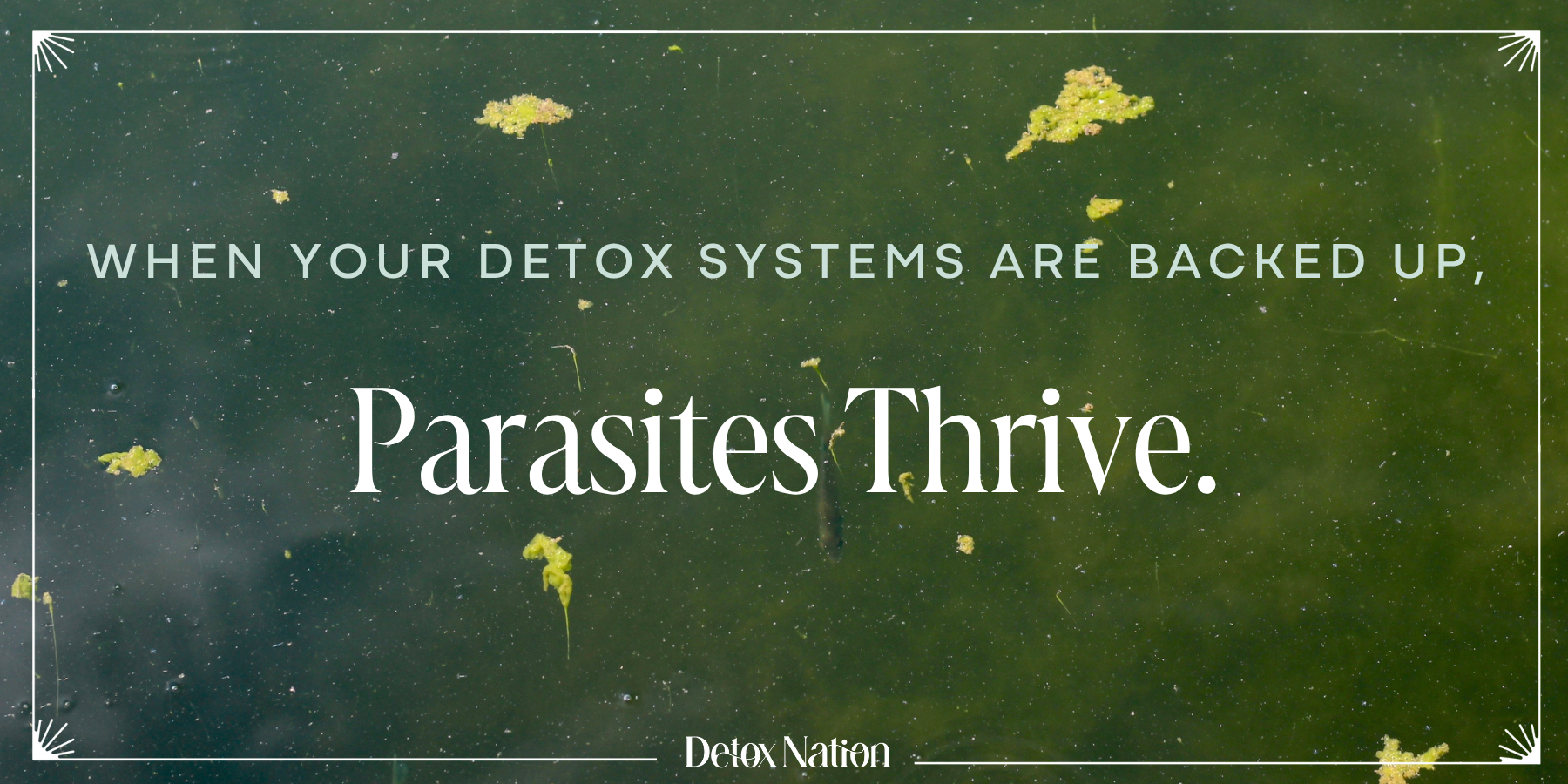
Immune Suppression
Parasites often employ immune suppression (17) to avoid detection and destruction by your immune system (18).
One way they do this is by triggering the production of regulatory T cells (19).
These cells suppress your immune response, allowing parasites to survive and multiply within you.
By calming your immune system, the parasites can party longer and cause more damage in your body.
Antigenic Variation
Antigenic variation allows parasites to change their surface proteins to evade your immune system (20).
Have you ever changed your clothes to fit in with your environment? It’s kind of like that.
For example, the malaria parasite frequently changes its surface proteins to avoid being recognized by the immune system.
This makes diagnosis and treatment challenging because the immune response must adapt to each new variant.
Molecular Mimicry
Parasites use molecular mimicry to blend in with their host’s tissues(21).
They produce molecules similar to the host’s cells, tricking the immune system into thinking they are part of the body.
This strategy helps parasites avoid immune detection (22) and can lead to autoimmune diseases, where the immune system mistakenly attacks the host’s own cells.
Remodeling of Host Gut
Some parasites remodel your gut to create a more suitable environment for themselves.
It would be like if your house guests decided to put up shelving or install an air conditioner in your home!
For instance, they may decrease mucus production, which normally protects your gut lining (23).
By reducing mucus, parasites can attach more easily to your gut wall and steal your nutrients.
This strategy not only helps the parasites survive but also disrupts your digestive processes and nutrient absorption.
Hijack Biofilms
Parasites don’t just take advantage of you. They also take advantage of the microbes living in your body.
Bacteria and fungi can form biofilms –a protective “invisibility cloak” that shields them from your body’s defenses and treatment efforts.
Parasites can hide in these biofilms and even interact with them to create changes in the bacterial composition (24).
Alter Host Micro RNA
Micro RNA are microscopic RNAs that help control biological functions through regulation of genetic expression.
They help to promote or suppress gene activation.
Parasites can alter your microRNA expression to promote infection and suppress clearance of the parasite (25).
As I started to learn allll the strategies parasites use to infect and feed on your body, I started to think of them as tiny evil masterminds! (But your body is brilliant too!)
Impact on the Body
Once inside, parasites can affect your body in several ways. For example, they can slow down your gut, block your intestines, make you sensitive to histamine, and cause food sensitivities.
Impair Gut Motility
Parasites like helminths can lead to slow gut motility (26), making it hard for your body to move food through your intestines.
This can cause symptoms like constipation, gas, and discomfort. I remember having entire months where I could only tolerate loose, comfy clothes due to the bloating!
When food doesn’t move quickly, it sits in your gut and creates gas (fermentation).
This condition can also make it harder to absorb nutrients effectively.
Intestinal Blockage
Some parasites, especially larger worms like hookworms, can physically block your intestines (27).
This blockage can be severe and cause intense pain, vomiting, and an inability to pass stool.
It can be a medical emergency that needs immediate attention (28).
An intestinal blockage can lead to nutrient deficiencies because your body can’t properly digest or absorb food.
Histamine Sensitivity
Parasites can trigger increased histamine sensitivity in your body (29).
Histamines are chemicals your immune system releases during allergic reactions.
This sensitivity can result in rashes, itching, headaches, and even asthma-like symptoms.
When parasites cause histamine release, it can mimic allergic reactions, making it tougher to diagnose the root cause
Food Sensitivities
Parasitic infection can also lead to food sensitivities (30).
You know how this goes – eating even a small amount of an innocuous food causes symptoms, but only in you.
They may damage the lining of your intestines, making you more sensitive to certain foods.
Common sensitivities include dairy and gluten, but you can even become sensitized to the foods you eat to be healthy.
Symptoms can include diarrhea, stomach cramps, and bloating.

Action Steps
Taking action against parasites involves both preventing infection and knowing what to do if you’re infected.
How Do I Avoid Parasites?
To avoid parasites, you need to practice good hygiene.
- Wash your hands with soap and water, especially before eating or preparing food.
- Make sure to clean vegetables and fruits thoroughly.
- Drink clean, distilled water and avoid drinking untreated water from lakes or streams.
- If you have dogs, make sure to pick up their “deposits” and dispose of them promptly to minimize poo-tential soil contamination.
- Don’t share hats, pillows, etc.
- Thoroughly cook food and avoid factory-farmed meats and fish.
- Cover up and use essential oil sprays to deter mosquitoes, ticks, and other ectoparasites.
- Avoid walking barefoot in areas where soil might be contaminated with feces. Wear shoes to protect your feet when walking in areas that might be contaminated.
- Ensure your pets are regularly checked and treated for parasites.
What Can I Do If I’m Infected?
If you suspect you have a parasitic infection, the most important thing is to work with an experienced parasite and root cause-literate practitioner.
Inexperienced practitioners, while well-intentioned, can delay effective treatment or even provide harsh treatments that crash your sensitive body.
You might wind up spending a fortune on the wrong treatments that don’t help and make you feel worse.
Conclusion
Parasites may be hidden, but the damage they cause is real.
Parasites don’t have to control your health– free yourself from these harmful invaders and reclaim your vitality.
And remember, I’m always in your corner!
Frequently Asked Questions
Learn more about different parasites, how they spread, and how to know if you have them. You’ll also find information about the connection between parasites, mold toxicity, and autoimmune illnesses.
How do heavy metals, pesticides, herbicides, and other toxins promote parasitic infection?
Toxins like heavy metals, pesticides, and herbicides can weaken your immune system. A weaker immune system makes it easier for parasites to invade and thrive in your body. These environmental toxins can also create an environment in your body that is more favorable for parasites.
What are the main ways parasites spread from one person to another?
Parasites can spread through contaminated food or water, poor hygiene, and close contact with an infected person. Insects like mosquitoes and sand flies can also transmit parasites through their bites.
How can you tell if your body is hosting parasites?
Symptoms of parasitic infections can vary but often include digestive tract issues like diarrhea, bloating, and stomach pain. You might also experience fatigue and weight loss. If you suspect you have a parasitic infection, it’s essential to consult a parasite-literate practitioner for diagnosis and treatment.
What are the categories of parasites known to affect humans?
There are three main types of parasites that affect humans: protozoa, helminths, and ectoparasites. Protozoa are single-celled organisms, helminths are worms, and ectoparasites live on the surface of your body, like lice and mites.
What’s the connection between parasites and mold toxicity?
Mold can produce toxins that suppress your immune system, making it easier for parasites to invade your body. The weakened immune response can result in chronic infections and a higher overall parasite load.
What’s the connection between parasites and auto immune illnesses?
Parasites can trigger autoimmune responses by causing your immune system to attack your own tissues. This can lead to chronic inflammation and autoimmune diseases. Identifying and treating parasitic infections can sometimes alleviate autoimmune symptoms.
P.S. — If the insights in this blog resonated with you, it’s time to take action. Hidden toxins like mold, parasites, heavy metals, and chemicals can silently impact your health—but there is a path to comprehensive healing. Join the Healing Labs program: a transformative 3-month journey to pinpoint hidden toxins, create a personalized detox plan, and get expert one-on-one support every step of the way. Book your free call today by following the link below and take the first step toward a healthier, more vibrant you. Let’s uncover what’s holding you back and create a clear path to healing together.
With the right knowledge and strategies, you can remove them from your life and experience deep healing, but no one else can do it for you.
Take our Parasite Quiz to see if parasites may be an underlying cause of your chronic symptoms.
Take the Parasite Quiz Now!
